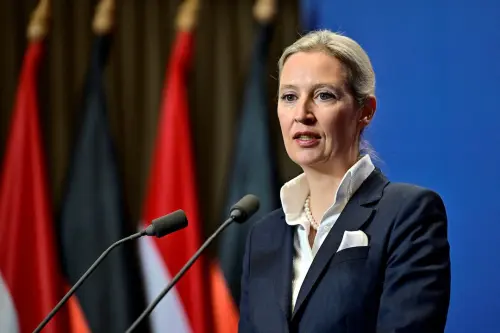In Berlin on February 22, Alice Weidel, the chancellor candidate of the far-right, appears like an unlikely face for a male-dominated, anti-immigration party that portrays itself as a defender of traditional family values and ordinary people.
At 46, Weidel is a mother of two sons with a Sri Lankan-born filmmaker, and she is proficient in English and Mandarin, having acquired a doctorate in economics in China. Hailing from western Germany as a leading figure in a party predominantly strong in the former communist East, she had a career at Goldman Sachs and Allianz Global Investors, in addition to working as a freelance business consultant before turning to politics.
Weidel's distinctive background is seen as an asset to the AfD by political analysts, as she adds an air of affluent liberal respectability to a party under suspicion by authorities of being antidemocratic.
Often seen in a dark suit, white shirt, and pearls, Weidel is noted for her composed and knowledgeable demeanor, standing out among her peers. Critics label her as a calculating opportunist and a "wolf in sheep's clothing."
Weidel is anticipated to lead the 12-year-old party to a historical success in the upcoming elections, strengthening its position in Germany's political sphere and potentially in Europe's largest economy.
Political scientist Oliver Lembcke from the University of Bochum believes, "Weidel is someone who can appeal to a broader public than the typical AfD constituency, to the middle-class bourgeoisie," highlighting her as a distinguished figure among the party members.
As the co-leader of the AfD, Weidel has witnessed a surge in support for the party in recent years, benefitting from growing anti-migration sentiments and dissatisfaction with the fractious coalition led by Chancellor Olaf Scholz, which disintegrated in November.
The AfD is poised to achieve a record 21% rating according to polls, trailing the conservatives at 29% but well ahead of Scholz's Social Democrats at 16%.
Though Weidel acknowledges that the AfD is currently unlikely to enter government due to other parties' reluctance to collaborate, there are hints of potential collaboration in the future, especially as the political landscape evolves.
Weidel's versatility and strategic maneuvering within the party have not gone unnoticed, with political scientist Hans Vorlaender acknowledging her adeptness in appealing to both mainstream and more extremist factions.
Despite some tensions within the party regarding her personal life, Weidel continues to navigate different perspectives to maintain her influential position, focusing on key issues like immigration and downplaying topics like her sexuality.
Overall, Weidel's journey reflects a complex and nuanced approach to politics, blending personal convictions with strategic leadership within a party known for its conservative stances.
